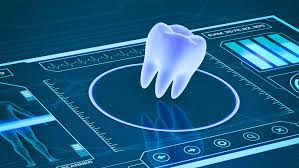There are many ways that artificial intelligence (AI) could impact dentistry in the coming years. Here are 25 potential ways:

1. Automated Appointment Scheduling
AI-powered tools streamline appointment booking, reducing wait times and improving patient satisfaction.
2. Improved Diagnostics
AI analyzes X-rays, CT scans, and other images to provide more accurate diagnoses for conditions like cavities, gum disease, and oral cancer.
3. Enhanced Treatment Planning
By analyzing patient data and medical histories, AI helps dentists create personalized and effective treatment plans.
4. Virtual Consultations
AI enables dentists to conduct remote consultations, making dental care more accessible.
5. Predictive Analytics
AI predicts the likelihood of dental issues, allowing for preventive care and early intervention.
6. Automated Insurance Claims
AI simplifies insurance claims processing, reducing administrative burdens for dental practices.
7. Patient Communication
AI chatbots handle patient inquiries, appointment reminders, and follow-ups, improving communication.
8. Personalized Treatment Recommendations
AI analyzes patient data to recommend tailored treatments, enhancing outcomes.
9. Remote Monitoring
Dentists can monitor patient progress remotely, reducing the need for frequent in-person visits.
10. Patient Education
AI-powered tools educate patients on oral health, promoting better dental care habits.
11. Predictive Maintenance
AI predicts when dental equipment needs servicing, minimizing downtime.
12. Fraud Detection
AI identifies fraudulent insurance claims, saving practices time and money.
13. Enhanced Patient Experience
AI reduces wait times, improves communication, and streamlines processes for a better patient experience.
14. Streamlined Patient Intake
AI automates paperwork and patient intake, saving time for both staff and patients.
15. Precision Medicine
AI enables dentists to adopt precision medicine approaches, tailoring treatments to individual needs.
16. Improved Record-Keeping
AI ensures accurate and complete patient records, enhancing care quality.
17. Dental Product Development
AI aids in creating innovative dental products and technologies.
18. Advanced Dental Training
AI-powered tools help dental students and professionals refine their skills.
19. Customized Orthodontic Treatment
AI helps orthodontists design personalized treatment plans for better results.
20. Dental Implant Planning
AI assists in planning precise and successful dental implant procedures.
21. Dental Research
AI accelerates research, uncovering new treatments and technologies.
22. Remote Patient Monitoring
AI tools allow dentists to track patient progress without frequent visits.
23. Efficient Practice Management
AI optimizes operations, from scheduling to inventory management.
24. Oral Cancer Screening
AI aids in early detection of oral cancer, improving patient outcomes.
25. AI CAN THINK FOR YOU AND HELP IN BETTER DECISION AT EVERY LEVEL & THAT’S WHAT IS GOING TO MAKE A DIFFERNECE BETWEEN THE DENTISTS WHO WILL KNOW AI AND WHO WILL NOT KNOW

Dr. Syed Nabeel, BDS, D.Orth, MFD RCS (Ireland), MFDS RCPS (Glasgow), is a dedicated dental professional with a special interest in Neuromuscular Dentistry (NMD). With over two decades of experience, he has been committed to diagnosing and managing occlusal and temporomandibular joint (TMJ) disorders using a patient-centered approach that integrates the principles of neuromuscular occlusion.
Alongside his clinical work, Dr. Nabeel is deeply interested in digital dentistry and the role of artificial intelligence (AI) in dental practice. He believes that technology has the potential to enhance patient care by improving diagnostics and treatment precision. His work in this field reflects his curiosity and dedication to advancing dentistry in meaningful ways.
Dr. Nabeel also enjoys sharing knowledge and has been lecturing extensively on neuromuscular dentistry. His approach to teaching emphasizes practical insights, evidence-based methods, and a focus on patient well-being, making his sessions both engaging and valuable for fellow professionals. Additionally, he is a sought-after speaker and blogger on practice management, where he provides insights on optimizing workflow efficiency, patient engagement, and the integration of modern technology in dental practices.
Based in Mysore, India, Dr. Nabeel is the founder of Smile Maker, a practice where he strives to combine advanced diagnostic tools with personalized treatment plans to help patients with occlusal and TMJ-related concerns. With a strong commitment to continuous learning and improvement, Dr. Nabeel remains deeply invested in the evolving landscape of dentistry, always seeking ways to enhance patient outcomes with care and compassion.
